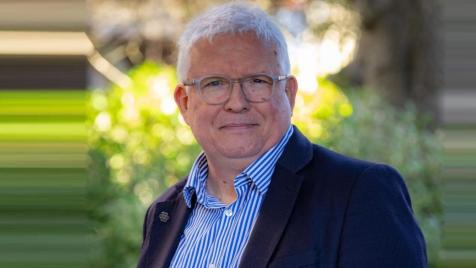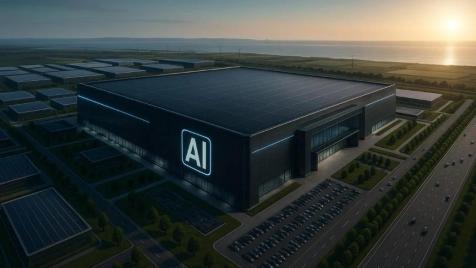Interview | Energy is Bulgaria's trump card in the battle for an AI gigafactory
If it does not actively participate in the AI industry, our country risks falling exponentially behind the rest

© ECONOMIC.BG / Mirela Vavova
Artificial intelligence is a hot topic for discussion, a strategic field for business, and a fierce arena for geopolitical competition. AI technologies are developing at an unprecedented pace, raising the question of the need for so-called artificial intelligence gigafactories. The giants will pour hundreds of billions into such facilities over the next few years, and Bulgaria may find itself with a chance to attract such investment—if the state plays its cards right. For now, at least, it is signaling that it is sitting at the table.
Why is attracting an AI gigafactory an opportunity to transform the entire economy? What are the chances of attracting such an investor, and how is it doing so far in this race? Why is energy so important? We discuss these and other questions with Dobroslav Dimitrov, a technology entrepreneur and member of the Advisory Councils of BRAIT and BASSCOM.
The topic of energy, resources, and their key importance for the transforming economy will be the focus of the upcoming event of Economic.bg – IN Sofia – on October 31.
Mr. Dimitrov, a few days ago, news broke that the government is in official negotiations with IBM for investment in an AI gigafactory. How is the state actually doing in its attempts to attract such an investor, especially against the backdrop of Romania, which seems more ready?
It seems cheerfully optimistic. Since August, there has been an interdepartmental working group in the Council of Ministers that has been working purposefully to prepare a proposal to investors with land, information about them, infrastructure security, and all the requirements that must be met in order to implement such a large project. The state has committed significant resources and is working in a focused manner.
I would not say that Romania is ahead. It simply responded before us to the invitation from the European Union. According to the information available, none of the participants who initially expressed interest have a good project, as there has been little time. Here, we need to divide things into two parts: one is the European funding line, and the other is attracting the so-called Hyperscalers (American companies making large billion-dollar investments), which are the only ones that can actually implement such a project in the real sense of the word. What is the role of the state in attracting such an investor?
What is the role of the state in attracting such an investor?
Such a project cannot be implemented by the state. Bulgaria must provide the conditions, infrastructure, licensing regimes, security guarantees, electricity – everything that the state provides to an investor to build their factory. The role of the state is to help and provide all the administrative tools for the rapid implementation of the project.
How can we stand out in the eyes of such a high-tech hyperscaler?
We can save them time. Many places around the world, west of us, are very attractive – Germany, for example, has announced that OpenAI will eventually build Stargate Europe there. However, Germany does not have the necessary electricity and power grid. Germany will eventually have them, but it will take time to build them, while we have all these things available here, right now. When it comes to competition in artificial intelligence technologies, saving someone a few years of time becomes a huge competitive advantage.
Bulgaria has this advantage—we have an available power grid and substations with a lot of free capacity. There are two reasons for this: one is that we once had a very energy-intensive industry, which we no longer have, and the other is that we are a transit country and have actually continued to invest in these transmission networks.
How much free capacity does the electricity transmission network have?
According to information from the Ministry of Energy, Bulgaria's electricity transmission network can carry around 20 gigawatts, and at peak times we use 6. We have a lot of free capacity.
The Netherlands and Ireland currently have a moratorium on the construction of new data centers because all such centers have been built there over the last 35 years and there is literally no more room for them in the electricity transmission network.
We, on the other hand, have substations in several places where they could be located. We have nuclear energy, which is the only green energy that can be relied on 24/7 in huge quantities. We have all these things available today.
Is energy the big question in the equation?
Yes, definitely. If you look at the news that OpenAI has signed a contract to purchase 6 gigawatts of computing power—the company is already saying, "We will buy 6 gigawatts of servers" – it doesn't say how many calculations they are doing, but how much electricity they are using.
Apart from us, France has the capacity and also seems like a more attractive destination.
France is already working on such a project with the United Arab Emirates. Macron announced it even before the announcement of European funding for gigafactories. This is a 50 billion project with investments from the United Arab Emirates with Nvidia, Oracle, and Mistral. And yes, this is thanks to the availability of nuclear energy and a lot of free capacity. France is currently the only country in Europe that can be said to be very advanced in this respect.
Romania also has nuclear energy, though...
Yes, but here's the key: Bulgaria is better positioned because we are a balancer on the Balkan Peninsula. We can rely on the Romanian nuclear power plant, Turkey to the south of us is also building nuclear power plants, we can provide electricity from all these places. In the long term, at some point, we will also be able to supply electricity from Ukraine, as it was always an exporter before the war. We are connected to all these energy centers, which again gives us an advantage.
You mentioned fast procedures and cooperation from the state, but political uncertainty in Bulgaria is a time bomb. What is the danger of this derailing such a potential project?
For something like that to happen, everyone has to be on board and work as one – the executive, the legislature, local authorities, the presidential institution. If there is confusion, it eliminates our chance entirely.
Speaking of Romania and specifically of European funding for an AI gigafactory, is there any reason to assume that two such facilities could be built in such close geographical proximity?
In principle, it is possible. But in reality, these four... I'm trying to be positive, but in reality, this is such a small and unambitious plan by the EU that it's sad. What four gigafactories for €20 billion? Right now, OpenAI is making a $100 billion investment in Texas alone, which it plans to increase to $500 billion. And that's just one company. Separately, we have Elon Musk's xAI, separately we have Google, separately we have Facebook. And Nvidia produces chips measured in electricity for one gigawatt every month. What Nvidia produces is connected to the power grid and uses one gigawatt every month. But we will make four on the entire continent, and that will be after some time, who knows when.
What is the situation with personnel, and do we have enough qualified people – on the one hand, those who would work in an AI gigafactory, and on the other, those who would build such a high-tech facility?
Bulgaria is an IT leader in Southeast Europe, so we have an extremely strong technological ecosystem. In terms of whether we can optimize, whether there are people to work, whether there are people to help – we have the people for that. Such an investment would create a huge ecosystem of other companies that would come and actually transform the entire economy of Bulgaria.
We certainly do not have the expertise to build something like this. The good-bad news is that nowhere else has this expertise to a large extent. There are no gigafactories in Europe. There are data centers, but for an effort like this, as with the new reactors at the Kozloduy Nuclear Power Plant, we will simply bring in specialists from all over the world.
To quote the founder of Nvidia, "a project like this is an engineering feat." That is why I have had discussions with the Construction Chamber, because the people involved in this need to realize the necessity of such skills. We are all starting from scratch, but those who are more adaptable and capable usually do better than those who rely on previous knowledge.
What kind of specialists would work in the gigafactory and how many jobs are we talking about?
That's not the most important thing. Data centers don't have many employees – the same kind of employees that work in data centers would work in the AI factory, just in greater numbers. But again, we are not talking about a huge number.
What is more important is this: one gigawatt of server power is worth about $20 – 30 billion. If Google, Amazon, or Facebook trust Bulgaria with $30 billion worth of servers, that settles the question of whether Bulgaria is a good destination for business once and for all. Second, it puts us on a very short list of countries that have something like this, which in the tech world again propels Bulgaria to the forefront – where technology happens. Third, such infrastructure will inevitably begin to attract an ecosystem of users, as distance matters for communication speed. This would attract many other investments that would completely transform the paradigm of the Bulgarian economy – literally putting it on a different vector of development.
How will an AI gigafactory build on what already exists here: the INSAIT and GATE institutes, along with the Discoverer supercomputer and the future small AI factory in Sofia Tech Park?
This is a fundamentally different project. It is good that we have attracted the AI factory and the supercomputer to Tech Park, as we are putting ourselves on the European map. But, note that they are located in one building. The gigafactory covers an area of one to two square kilometers – it is a mini city. There is no basis for comparison in terms of scope and scale.
What is in Tech Park can be very useful for the local ecosystem and for training small models, for small developments in institutes and universities. The gigafactory is what trains the next generation of technology.
What are the economic benefits for Bulgaria and what will we lose if we do not attract such investment?
What will we lose? We will remain in the 18th century while others are in the 22nd. The entire global economy is growing exponentially as a result of artificial intelligence. If we don't participate, it means we are falling behind exponentially.
This is an existential threat. All countries that missed the industrial revolution did not fare very well afterwards. The future is currently at exactly such a watershed – between pre- and post-industrial society. Which side of the fence you will be on depends solely on how quickly you act. Incidentally, this also applies on a personal level. If you don't jump over this barrier, you will simply remain in a different time. This is the big threat. And the possibilities are endless. There are currently bets in Silicon Valley on when the first billion-dollar company with one employee will appear – the founder, with all other positions filled by AI agents.
What are your observations regarding the perception of AI by Bulgarian businesses?
In the software sector in Bulgaria, things are really happening, processes are being transformed on a massive scale, and the companies themselves are undergoing fundamental changes. BASSCOM has also played a major role as a conduit and link for sharing information between companies. So software companies are extremely well positioned and are applying these tools. Companies that have missed the boat will not be companies for much longer. For other businesses, a lot depends on what they do, but the process will continue to spread rapidly.
How has the software industry and processes changed over the last two to three years since the emergence of ChatGPT?
The first very unpleasant thing is the disappearance of junior positions, which is quite short-sighted on the part of companies, because where will the next senior employees come from if you don't hire juniors? But this is a global trend and a direct consequence of the advent of AI. Currently, you can actually do a really big project with a very small team of people. This will start to have a very serious impact on outsourcing companies.
If we broaden the scope, the whole world is currently revolving around this. Geopolitics revolves around this—it is literally dictated by who has access to the chips, who will build the factories, who will own the technology. China and the United States have announced their doctrines for global domination in artificial intelligence: the Americans with their action plan for AI global domination and projects such as Stargate, the Chinese through open models with which they will try to impose a standard on the rest of the world.
Speaking of geopolitics, how does the ongoing war in Ukraine, which is only a few hundred kilometers away, affect investor interest?
Is it part of the equation? Yes, of course, but also—think about it—there aren't that many places in the world where there isn't a war a few hundred kilometers away. Israel, for example, is not a destination that investors have shunned, even though there is constant war 20 km away. And whether it is a few hundred or 1,000 km away, it does not really matter. Furthermore, an attack on such infrastructure does not necessarily have to be physical, and in reality there are no safe places.
Rather, the arguments should be in favor of decentralization—there should be gigafactories in Western Europe, Central Europe, and Eastern Europe – to prevent total destruction in the event of an incident.
And what happens to technology in the context of war?
If we look specifically at the war in Ukraine – two years ago there were some drones, but now the war is entirely drone-based. And they are becoming increasingly autonomous. By the end of this year, Ukraine alone will have produced 6-8 million drones. Three simultaneous breakthroughs are being made in each vertical. The increasing autonomy of these drones, their entire logistics system, and all these things are happening at a crazy pace.
Military technologies are currently far behind civilian ones due to the long absence of this topic from the focus of top engineers and companies. It is time to rearrange our priorities. The high-tech industry must find bridges with the established defense industry so that we can start producing a new generation of defense. The Center for Defense Innovation is a step in the right direction. This topic must become central and key for technology companies.
Translated with DeepL.

 Mirela Vavova
Mirela Vavova 




